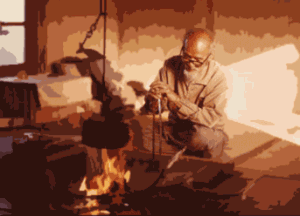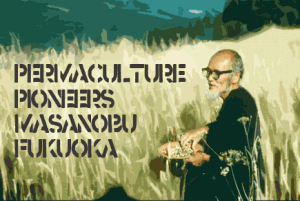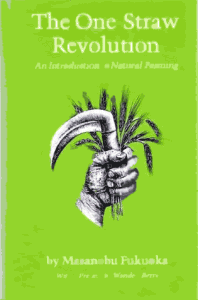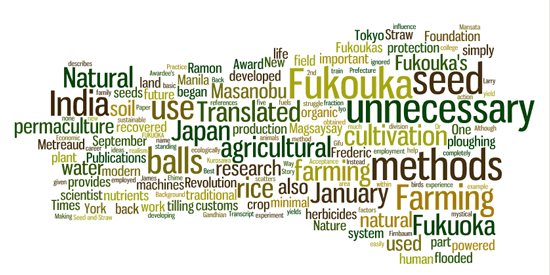Although Masanobu Fukouka developed his own system of natural farming he is none the less a very important figure within the broader family of permaculture pioneers as Fukouka’s methods are permaculture in all but name.
Background
 Fukuoka was born on the 2nd February 1913 in Iyo, Ehime, Japan, he went on to train as a microbiologist and agricultural scientist at the Gifu Prefecture agricultural college, Fukuoka then began a career as a research scientist specialising in plant pathology, during his period of formal employment he worked as an agricultural customs inspector for the plant inspection division of the Yokohama customs bureau.
Fukuoka was born on the 2nd February 1913 in Iyo, Ehime, Japan, he went on to train as a microbiologist and agricultural scientist at the Gifu Prefecture agricultural college, Fukuoka then began a career as a research scientist specialising in plant pathology, during his period of formal employment he worked as an agricultural customs inspector for the plant inspection division of the Yokohama customs bureau.
In 1937 Fukuoka became ill with pneumonia, as he recovered from this condition he had a profound mystical experience that led him to doubt and discard the practices of modern Western agricultural science. When he had completely recovered from his illness he began to experiment and devise new techniques when working in his organic citrus orchards, he then used the observations and research from his experimentation to develop what he describes as Natural Farming.
The work of Fukouka
In the natural farming model that Fukouka developed, the system is underpinned by five core principles:
- human cultivation of soil, ploughing or tilling are unnecessary, as is the use of powered machines
- human cultivation of soil, ploughing or tilling are unnecessary, as is the use of powered machines
- prepared fertilizers are unnecessary, as is the process of preparing compost
- weeding, either by cultivation or by herbicides, is unnecessary. Instead only minimal weed suppression with minimal disturbance
- applications of pesticides or herbicides are unnecessary, pruning of fruit trees is unnecessary
 A very basic example of Fukoukas natural farming in action: he scatters seed balls in a field where there is a standing crop that is in the latter part of its life, he then covers the seed balls with the stalks and organic matter crop, this provides protection for the emerging seeds, it suppresses weeds and provides nutrients for the soil, and also an increase in yield, as part of this method the rice fields are not continually flooded as is the case with traditional rice production. A field would only have to be flooded once when needed. Fukouka also brought back the ancient use of seed balls, these seed balls contained nutrients to help the seeds to germinate, they also offered protection from seed eating birds and animals. In terms of his influence on ecologically sound alternative methods of cultivation and growing, his book ‘One Straw revolution’ is an important work and a valuable addition to any permaculture Library.
A very basic example of Fukoukas natural farming in action: he scatters seed balls in a field where there is a standing crop that is in the latter part of its life, he then covers the seed balls with the stalks and organic matter crop, this provides protection for the emerging seeds, it suppresses weeds and provides nutrients for the soil, and also an increase in yield, as part of this method the rice fields are not continually flooded as is the case with traditional rice production. A field would only have to be flooded once when needed. Fukouka also brought back the ancient use of seed balls, these seed balls contained nutrients to help the seeds to germinate, they also offered protection from seed eating birds and animals. In terms of his influence on ecologically sound alternative methods of cultivation and growing, his book ‘One Straw revolution’ is an important work and a valuable addition to any permaculture Library.
Fukouka and a permanent culture of the future
As we struggle towards developing ideas for a resilient and sustainable future Fukouka’s methods could prove life saving for rice producing countries, simply down to the fact that a fraction of the water used in traditional rice production is used in Fukoukas methods and with water being our most precious resource his methods simply cant be ignored if we to address the issue of water with any sense of realism
Similarly if we applied his methods to smaller scaled down versions of modern agriculture, as his research suggests, greater yields could be obtained from a given area without the use of any fossil fuels of agrochemicals. In a world where so much land has become unusable due to a whole of factors ranging from pesticide use to over farming, Fukouka’s seed balls could easily be employed to bring back fertility and wildlife to these pieces of land.
Masanobu Fukouka Publication and references
 Fukuoka, Masanobu. Interview by Dr. James R. Rush. Tape recording, September 1988. Ramon Magsaysay Award Foundation, Manila.
Fukuoka, Masanobu. Interview by Dr. James R. Rush. Tape recording, September 1988. Ramon Magsaysay Award Foundation, Manila.
The God Revolution. Translated by Alfred Firnbaum. Japan.
The Natural Way of Farming. Translated by Frederic P. Metreaud. Tokyo and New York: Japan Publications, 1985.
“Nature Farming: Its Philosophy and Practice.” Paper presented at Awardee’s Forum, Ramon Magsaysay Award Foundation, Manila, 5 September 1988. Transcript.
The One Straw Revolution. Translated by Chris Pearce, Tsune Kurosawa, and Larry Korn. Emmaus, Pennsylvania: Rodale Press, 1978.
The Road Back to Nature. Translated by Frederic Metreaud. Tokyo and New York: Japan Publications, 1987.
“Making Natural Farming Greener.” Indian Express, 23 January 1988, 15.
Mansata, Bharat. “The Harbinger. ” Illustrated Weekly of India, 10- 16 January 1988, 56-57.
“Natural Farming Gaining Acceptance—FUKUOKA.” The Daily (India) 6 January 1988, 17.
“Plants Grow Best on Their Own.” The Telegraph (India) 18 December 1987, 13.
“Sarvodaya Plea for Gandhian Values.” Times of India, 1 January 1988, 37.
“The Seed-and-Straw Story.” Economic Times (India) 22 November 1987, 2
Steve

